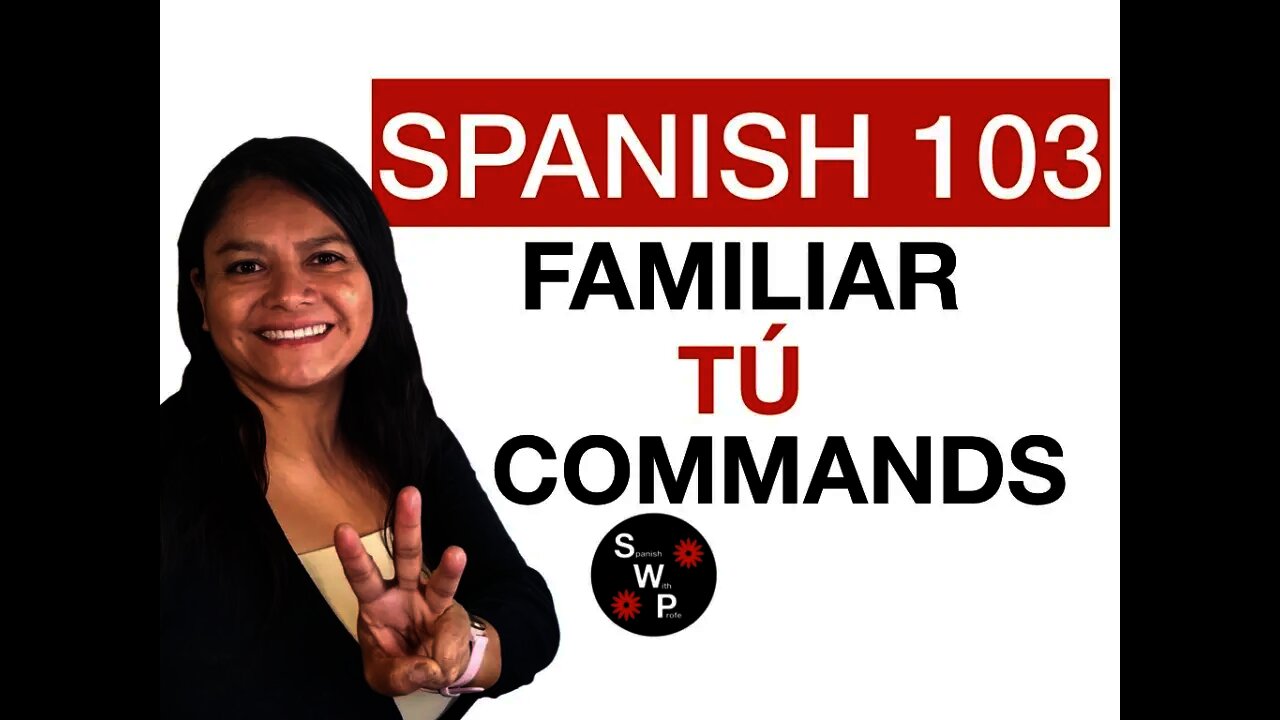Premium Only Content

Spanish 103 - Familiar Commands = Affirmative and Negative Tú Commands in Spanish Spanish With Profe
In this video you will learn the Familiar Commands otherwise known as the Tú commands.
The Tú commands have a very distinct positive form and a negative form.
Commands are able to stand on their own. They do not depend on anything.
Commands give orders. CULTURAL NOTE: The Tú commands are informal so you will use them to command a child or peers to do something but you will never use them for an elder such as your parents out of respect.
In the Tú commands there are Regular verbs and Irregular verbs.
To form the commands of regular verbs do the following:
-ar=a (when positive)
-ar= es (when negative)
-er/-ir=e (when positive)
-er/-ir=as (when negative)
As you can see when it's positive it resembles the third person (-ar or -er/-ir) singular form and when it's negative resembles the subjunctive form, in which all verb endings in -ar/-er/-ir form their subjunctive form by switching their vowels.
Here are some examples:
dibujar (to draw)
+dibuja
-No dibujes
(Draw, Don't draw)
comprender (to understand/to comprehend)
+comprende
-No comprendas
(Comprehend, Don't comprehend.)
You can see that the ending when it's positive will look very different than when it is negative.
Keep track of that difference.
vivir (to live)
+vive
-No vivas
(Live, Don't live)
Some Ways Below To Help Out The Channel Listed Below
You can see that the ending when it's positive will look very different than when it is negative.
Keep track of that difference.
Remember to keep track of these spelling changes when you are writing the negative Tú commands
-car=qu
-gar=gu
-zar=c
-ger=j
All (reflexive, direct & indirect object pronouns) must be attached to all Positive commands.
And will carry an accent mark or Tilde (') if it's more than two syllables.
Bañarse
+Bánate
-No te bañes
(Bathe yourself, Do not bathe yourself)
Since we are talking about Tú you must put the reflexive pronoun for it, te.
Buscar el perro.
el perro=lo (direct object pronoun)
Buscarlo
+Búscalo
-No lo busques
(Look for him, Don't look for him.)
Since buscar ends in -car in the negative form we must make a spelling change.
The following verbs have have a very irregular form. You will notice they are monosyllable.
Positive
poner=pon
tener=ten
salir=sal
venir=ven
You can see that these four verbs, seem to be dropping the er/ir ending and keeping the first three letters to make the positive Tú commands.
Follow the yo form in the present and drop the "o" to form their negative form
e.g. No pongas, No tengas, No salgas, No vengas
Positive Tú commands
Ser=sé
ir=ve
decir=di
hacer=haz
These ones are very different you just need to memorize them. Their positive form it's very unique.
Their negative form will look like the subjunctive form
(No seas, No vayas, No digas, No hagas)
Traer las revistas
las revistas=las (direct object pronoun)
traerlas
+tráelas
-No las traigas
(Bring them, Do not bring them.)
You must add a tilde on the positive command since we are adding a pronoun to it, thus changing the stress syllable.
► DONATIONS via PayPal (To help support the channel you can donate via PayPal): https://paypal.me/SpanishWithProfe?locale.x=en_US
► ROBINHOOD (Get 1 Stock When You Sign Up. Easy to use app for investing and you get a free stock.): https://join.robinhood.com/grants1730
► WEBULL (Get 2 Stock When You Sign Up):https://www.webull.com/activity/get-free-stocks?inviteCode=uYiu2aNdG46N&source=invite_gw&inviteSource=wb_oversea
► CRYPTO.COM Use my referral link https://crypto.com/app/e3p3g4rc9m to sign up for Crypto.com and we both get $25 USD :)
-
 0:42
0:42
Spanish With Profe
2 years agoLearn how to say #flood in Spanish #inundación
310 -
 LIVE
LIVE
Nerdrotic
3 hours ago $6.26 earnedRacist Academics Attack Tolkien | Hollywood to Strike AGAIN? | AI Doomsday - Friday Night Tights 376
2,810 watching -
 LIVE
LIVE
Dr Disrespect
10 hours ago🔴LIVE - DR DISRESPECT - ARC RAIDERS - THE ULTRA EXTRACTION GAME
837 watching -
 27:49
27:49
Robbi On The Record
20 hours ago $4.16 earnedRevelation, the End Times, and Satan’s Little Season part II - ft JT
12.9K5 -
 54:37
54:37
HotZone
4 days ago $0.95 earnedTen Hostages Missing! Will Hamas Keep Its Word?
17.2K4 -
 8:05
8:05
Rethinking the Dollar
7 hours agoFiat’s Endgame? Gold & Silver Lines Don't Lie
4.18K5 -
 LIVE
LIVE
LFA TV
23 hours agoLIVE & BREAKING NEWS! | FRIDAY 10/17/25
1,005 watching -
 1:13:16
1:13:16
vivafrei
4 hours agoJohn Bolton is a DUMB CRIMINAL (Allegedly) - Trans Madness in Loudoun Country! Tampon Tim AND MORE!
76.2K39 -
 2:45:30
2:45:30
Barry Cunningham
17 hours agoBREAKING NEWS! PRESIDENT TRUMP MEETS WITH UKRAINE PRESIDENT ZELENSKY!
61.1K22 -
![MAHA News [10.17] Fertility Crisis, Redoing Vax Schedule, Psychiatry Corruption, Vegan vs Carnivore](https://1a-1791.com/video/fwe2/78/s8/1/Q/v/s/r/Qvsrz.0kob-small-MAHA-News-10.17.jpg)
Badlands Media
15 hours agoMAHA News [10.17] Fertility Crisis, Redoing Vax Schedule, Psychiatry Corruption, Vegan vs Carnivore
22.3K3